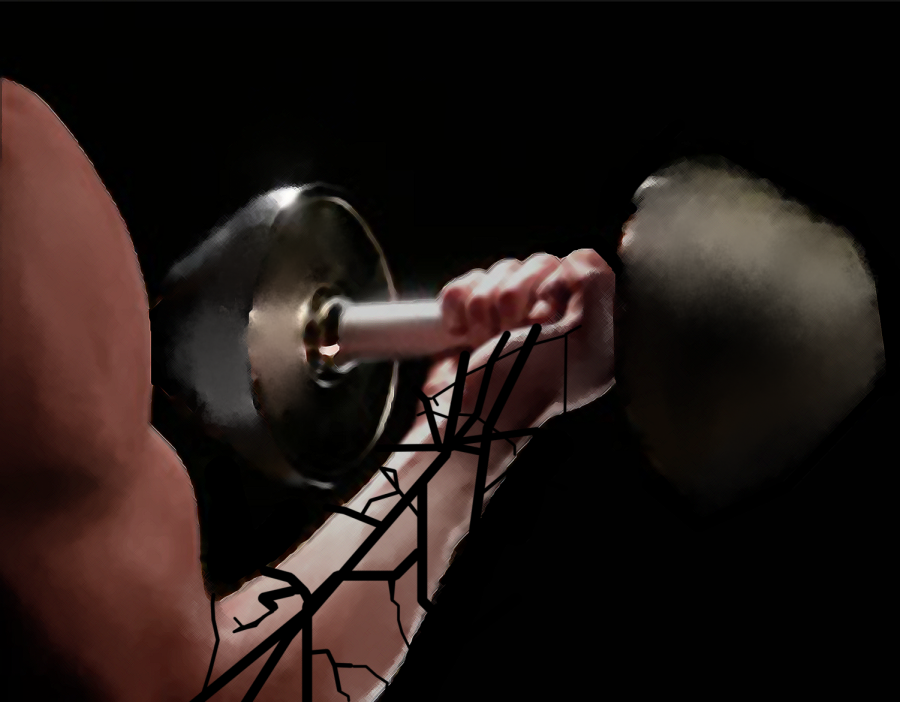Toxic masculinity places a mask on our society
Society’s facade of toxic masculine strength is, at best, truly fragile.
May 28, 2020
I went to a baby shower before the COVID-19 pandemic; the parents had a gender reveal party with balloons. The balloons were stuffed in a box, pink being a girl and blue being a boy. When the box opened and a bunch of pink balloons came out, everyone was excited and jumped for joy. I mean, obviously so was I! I just got a cute new little bundle of joy to play with. But when I came home, I realized how the standard pink and blue has been imprinted in our minds since we were born.
When boys were young they got blue goody bags and when girls were young they got pink goody bags; boys played with action figures and played violent video games while girls played with Barbies and dolls.
But it isn’t just the type of “toys” we play with and “clothes” which we wear which has always differentiated between a boy and a girl. It is also the psychological and emotional toll which is altered.
Ever since we were young, our minds have been programmed based on our gender. Girls could cry when they got hurt on the playground, but a boy had to “man up” and decide that a small little cut could not make him break his “manhood.”
I remember when I was in fifth grade and I saw one of the boys in my class start to cry; I had realized, “Wow, this is the first time I’ve seen a boy cry.” And I was already 10 years old, it had just been so strange and new to me.
All of this described in two words? Toxic masculinity. According to Dictionary.com, the phrase means, “A cultural concept of manliness that glorifies stoicism, strength, virility, and dominance, and that is socially maladaptive or harmful to mental health.”
An anonymous Dougherty Valley male echoed, “Boys have problems too, it’s not only girls’ hearts who get broken or girl’s parents who die. This applies to all of us. We all suffer the same thing because we all are human, and we need to cry. We both have tear ducts, so how come only one gender can use them?”
A documentary named “The Mask You Live In” directed by Jennifer Siebel Newsom shows all the hardships men face by keeping their feelings inside of them.
The documentary features eight boys with a variety of backgrounds, as some got bullied for acting “feminine” when they were young and others whose dads had forced them to become “manly” and join football which had forced them to be in a box of confusion.
The idea of toxic masculinity impacts men every day even if it is for the “smallest reasons”; however, it impacts them greatly in severe topics too. One of the grench-wretching topics which many fail to address is the sexual assault which many men face: 1 out of every 6 men has faced sexual assault or abuse in their life.
According to RAINN, the Rape, Abuse, and Incest National Network, many men can feel the same effect of sexual assault as women; however, the way they intrepet it can be different, as many men feel self-doubt and question their self-worth because they feel they should have been able to fight off their assaulter.
Absolutely no one should feel this way, as it is our body and we do not need to justify to ourselves what we could have done better. Non-profit organizations like 1in6 support male sexual abuse victims, which are giving many people a support system for what they have endured.
This is an issue which we must continue to fight for as everyone deserves to speak up for their rights which they have.
According to Focus For Health, many men fall under five characteristics as toxic masculinity is so driven in our society. Many men feel the need to do everything on their own without any help. They act on emotional dissociation besides anger, which is a common trait resembling an extreme aspiration for sexual, physical and intellectual dominance. They may look down upon a woman’s body and self-worth, and many feel any act of being “feminine” correlates to them being sexually attracted to other men.
Joe Ehrmann, a coach and a former NFL Player who was featured on the documentary, said, “The most destructive word every man receives when he is born is to be a man.”
That hits so close to home for so many young men as the question really comes down to: What does it really mean to be a man? Does it mean to hide your feelings and to act “strong?” Being the jock? The nerd? The “always aroused and sexually stimulated” individual?
It will take society a while to figure out what it means to be a man. However, being a man is not correlated with being a “jock,” being “overly brave” or not being able to self-empathize by giving yourself a break sometimes, as being a man means being a human. This means showing empathy, being able to cry, being able to seek help and lastly, telling yourself you are enough and you are loved.
If you or a loved one needs help please reach out to the National Sexual Assault Line: 1-800-656-4673. Remember you are loved and worthy.




